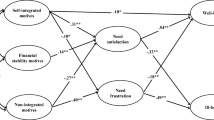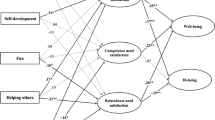Abstract
The pursuit of preferences without demands is a major pathway to mental health and happiness, according to REBT theory and research. Even when people are thwarted in the pursuit of their preferences, they will only experience healthy negative emotions, which will spur them on to construct solutions to obstacles that prevent them from reaching their goals. However, if they are thwarted when rigidly demanding their preferences, they may experience unhealthy negative emotions and act in ways that most likely will be self-defeating. We suggest that this evidence-based classic REBT framework could benefit further by clarifying whether there is a neglected distinction to be made between two types of preference. We raise the question whether there are ‘ought’ preferences as well as ‘want’ preferences, fundamentally different in purpose, which when turned into demands, can lead to distinctly different secondary irrational beliefs and unhealthy negative emotions and behaviour patterns. We explore this possible distinction as a question which has potential ramifications for theory, research and practice.
Similar content being viewed by others
Notes
Traditionally in REBT nomenclature the word ‘ought’ is taken to mean a demand. However we propose a distinction can be made between a flexible non-demanded ‘preferential ought’, expressing the ordinary language meaning implying duty and obligation (Oxford English Dictionary 2014), and an absolute, rigidly demanded ‘ought’, which combines the traditional REBT demand with duty and obligation. This point is discussed further in the text.
References
DiGiuseppe, R. (1991). A rational-emotive model of assessment. In M. Bernard (Ed.), Using rational-emotive therapy effectively (pp. 151–172). New York: Springer.
DiGiuseppe, R., Doyle, K., Dryden, W., & Backx, W. (2014). A practitioners guide to rational emotive behavior therapy (3rd ed.). New York: Oxford University Press.
Dryden, W. (2009). Understanding emotional problems: The REBT perspective. London: Routledge.
Ellis, A. (1962/1977). Reason and emotion in psychotherapy: A new and comprehensive method of treating human disturbances. Secaucus, NJ: The Citadel Press.
Ellis, A., & Dryden, W. (2007). The practice of rational emotive behavior therapy (2nd ed.). New York: Springer.
Gilbert, P. (1992). The evolution of powerlessness. New York: Guilford Press.
Hardin, E. E., & Lakin, J. L. (2009). The integrated self-discrepancy index: A valid and reliable measure of self-discrepancies. Journal of Personality Assessment, 9, 243–245.
Higgins, E. T. (1987). Self-discrepancy: A theory relating self and affect. Psychological Review, 94, 319–340.
Higgins, E. T. (1997). Beyond pleasure and pain. American Psychologist, 52, 1280–1300.
Higgins, E. T. (2012). Regulatory focus theory. In P. A. M. Van Lange, A. W. Kruglanski, & E. T. Higgins (Eds.), Handbook of theories of social psychology (Vol. 1). Thousand Oaks, CA: Sage.
Higgins, E. T., Bond, R. N., Klein, R., & Strauman, T. (1986). Self discrepancies and emotional vulnerability: How magnitude, accessibility and type of discrepancy influence affect. Journal of Personality and Social Psychology, 51, 5–15.
Hook, E. V., & Higgins, E. T. (1988). Self-related problems beyond the self-concept: Motivational consequences of discrepant self-guides. Journal of Personality and Social Psychology, 4, 625–633.
James, W. (1981). The principles of psychology. Cambridge, MA: Harvard University Press. (Originally published in 1890).
Jones, N. P., Papadakis, A. A., Caitlin, M. H., & Strauman, T. J. (2009). Over and over again: Rumination, reflection and promotion goal failure and their interactive effects on depressive symptoms. Behaviour Research and Therapy, 47, 254–259.
Klenk, M. M., Strauman, T. J., & Higgins, E. T. (2011). Regulatory focus and anxiety: A self-regulatory model of GAD-depression comorbidity. Personality and Individual Differences, 50, 935–943.
Mead, G. H. (1934/1967). Mind, self and society. Chicago: University of Chicago Press.
Molden, D. C., Lucas, G. M., Gardner, W. L., Dean, K., & Knowles, M. L. (2009). Motivations for prevention or promotion following social exclusion: Being rejected versus being ignored. Journal of Personality and Social Psychology, 96, 415–431.
Oxford English Dictionary. (2014). Ought, as a model auxiliary. Expressing duty or obligation of any kind; originally used of moral obligation, but also in various more general senses, expressing what is proper, correct, advisable, befitting, or expected. Orig. and chiefly in past tense form (indicative or subjunctive), which may be either past or present in meaning. (The only current use in standard English.) In Oxford English Dictionary, the Definitive Record of the English Language. Oxford: Oxford University Press.
Rogers, C. R. (1961). On becoming a person. Boston: Houghton Mifflin.
Strauman, T. J. (1989). Self-discrepancies in clinical depression and social phobia: Cognitive structures that underlie emotional disorders? Journal of Abnormal Psychology, 98, 14–22.
Strauman, T. J. (2002). Self-regulation and depression. Self and Identity, 1, 151–157.
Strauman, T. J., Veith, A. Z., Kolden, G. G., Woods, T. E., Klein, M. H., & Papadakis, A. A. (2006). Self-system therapy as an intervention for self-regulatory dysfunction in depression. A randomized comparison with cognitive therapy. Journal of Consulting and Clinical Psychology, 74, 367–376.
Trower, P., Bryant, B. & Argyle, M. (1978/2014). Social skills and mental health. London: Methuen. Republished: London: Routledge.
Veith, A. Z., & Strauman, T. J. (2003). Self-system therapy (SST): A theory-based psychotherapy for depression. Clinical Psychology: Science and Practice, 10, 245–268.
Yalom, I. (1980). Existential psychotherapy. New York: Basic Books.
Author information
Authors and Affiliations
Corresponding author
Rights and permissions
About this article
Cite this article
Trower, P.E., Jones, J. Demanded Wants and Oughts: An Overlooked Distinction in REBT?. J Rat-Emo Cognitive-Behav Ther 33, 95–113 (2015). https://doi.org/10.1007/s10942-014-0204-5
Published:
Issue Date:
DOI: https://doi.org/10.1007/s10942-014-0204-5




